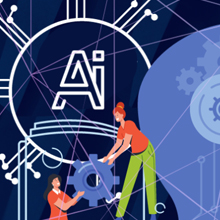Beyond the Hype: Real-Life Applications of AI in Claims

 |
By: Nikki Jackson, MBA, CPCU, ARM, CDMS |
I receive numerous questions from fellow claims professionals, and one that frequently arises is, “Will AI replace claims adjusters?” Well, my standard answer these days is a firm “No, I don’t see AI snatching away the adjusters’ job.” But here’s the twist—while it’s not taking over their jobs, AI is gearing up to be their sidekick, tackling some tasks, making things slicker, and cranking up the accuracy dial.
Then comes the next big question: “How will AI evolve the role of the claims professional? Any examples?” This is where it gets interesting because we’re all knee-deep in AI without even realizing it. Picture this: spam detection in your emails, search results popping up magically, having witty chats with smart assistants, and breezing through predictive text. Guess what? That’s AI at play, right under our noses!
AI can also be achieved in workers’ comp with machine learning — think about automated claims assignments, claims training streaming recommendations while an adjuster is in the flow of work and predictive analytics.
Thanks to the ongoing talent shortage, many adjusters have caseloads that are too high, and unfortunately, I don’t see the talent shortage going away any time soon. Adjusters need help. Let’s go beyond some of the AI hype and dive into an example at the desk level.
I’m of the opinion claims professionals should be leveraging generative AI to draft verbiage for things like action plans, reserve requests, settlement evaluations, claim review summaries, and more. I’m talking about tools like ChatGPT – with caution. It’s important to exercise caution about what we put into the model and analyze the output before blindly pasting it into our documents/claims systems.
Many adjusters can extract claim notes or generate a text version of substantial claim documents (think settlement recommendations from legal, IMEs, prior claim summaries, etc.). They can place this information in the model and provide the appropriate prompt to generate content (again, with caution – redact PII and such).
Just think about AI-generated settlement evaluations for a minute. Although AI-generated settlement evaluations can provide valuable insights, it’s essential to use them as support tools rather than relying solely on automated recommendations. Think of the output as a draft or framework. The experience and expertise of a real claims adjuster are crucial in considering the unique aspects of each claim and making those necessary edits.
Remember, the golden rule here is garbage in equals garbage out. Get the right claim info into the AI model, use the right prompt, and you’ll be cooking with gas. And hey, if the likes of ChatGPT sound cool but you’re a bit clueless on how to wield them, no worries—I’ve got your back. I’ll be dishing out the details and highlighting The Work Comp Power Prompt™ in an upcoming webinar hosted by MTI America.
Let’s make a pact as an industry to arm ourselves with knowledge and crank up those skills. Together, we’ll ride the AI wave and keep the claims game strong! |

Identify and Prevent Fraudulent Workers' Compensation Claims this Holiday Season
As the holiday season approaches, knowing the potential risks of increased workplace activity is important. Industries like retail and hospitality are especially vulnerable, with longer working hours and higher customer traffic. Unfortunately, this surge in activity could bring an increase in fraudulent workers’ compensation claims.
Read More >>

Revolutionize Spinal Diagnosis with Artificial Intelligence
In recent years, advances in artificial intelligence (AI) technology have enabled massive changes to the medical industry – and spinal diagnosis and treatment are no exception.
Read More >>

Sign Up for CE Webinar Alerts >>
EVENTS
 |
Webinar
Dec. 7, 2023
Tech Trends for Claims Professionals: AI Focus
Register Today |
 |
Dec. 5–6, 2023
Virginia Self-Insurers Association
|
|
|



